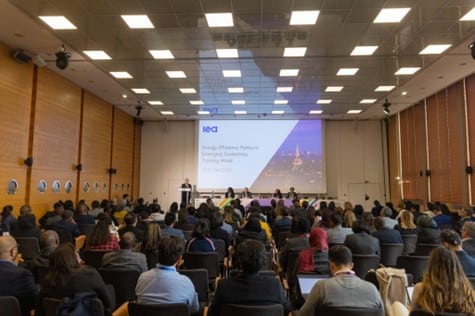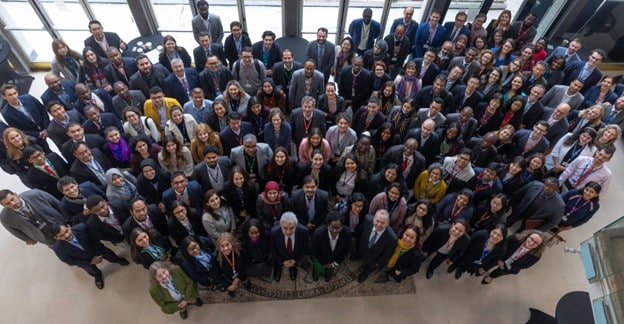A view towards the long term
The International Energy Agency (IEA) is at the forefront of global efforts to transition to clean energy. Originally founded in 1974 to help coordinate a response to oil supply disruptions, the IEA has since evolved into a broader organization that provides authoritative analysis, data, and policy recommendations to enhance energy security, affordability, and sustainability worldwide. Its work includes building international partnerships focused on clean energy transitions and mitigating climate change, fostering diplomatic efforts to help countries reach net zero emissions, and technology and training programs designed to build capacity in partner countries.
The IEA is a known partner and provider of technical assistance across many sectors, geographies, and tactics. A key component of both the clean transition and efforts to reach net zero is improving energy efficiency. Energy efficiency technologies and policies are already in existence, and, though they often lack the highly visible profile of a new renewable energy plant, they benefit people immediately by lowering their energy bills, decreasing pollution, avoiding heat stress, and other benefits.
“The IEA designs programs with a view towards the long-term: strategic planning, knowledge sharing and coalition building. They work closely with global leaders to support and design initiatives to promote the kind of large-scale market transformation programs and skill and knowledge sharing needed to make Net Zero and the clean transition a reality.”
Seema Paul, Program Director, India, Sequoia Climate Foundation
The IEA emphasizes the benefits of energy efficiency as “the leading edge,” because it is “available, cheap, and technologically mature,” Brian Motherway, Head of Energy Efficiency and Inclusive Transitions at IEA, explains. By prioritizing energy efficiency, the IEA helps countries achieve their respective Nationally Determined Contributions, or NDCs, while enhancing economic opportunities and their people’s well-being.
Shining the light of India’s LED success: promoting South-South collaboration
India is quickly emerging as a global leader in energy efficiency. Under the guidance of the Indian Presidency, the G20 established the goal of doubling the global average rate of improvement in energy efficiency within this decade, which is critical for meeting global climate goals. India leads by example, having already established several innovative domestic energy efficiency policies and market transformation programs that have become the basis for energy efficiency progress in the region.
Launched in 2015 and managed by India’s Energy Efficiency Services Limited (EESL), the Unnat Jyoti by Affordable Light Emitting Diode (UJALA) program sought to transition all household lighting in India to LED lighting while increasing public awareness of the benefits of energy efficiency. As of 2022, UJALA has led to the installation of 367.9 million LED lights across households in India, providing millions of people with reliable light, allowing children to study, households to function, and businesses to stay open longer—all while preventing 38.7 million tons of CO2 emissions.
The program’s success lies in its ability to demonstrate the connection between improved energy efficiency and peoples’ health and wellbeing: by showing how energy efficiency can improve the lives of people, the UJALA campaign gained enormous political and public support that paved the way for its success. At India’s request, the IEA partnered with EESL to develop a case study and take the project global.
“We worked with EESL to develop a case study of UJALA’s growth potential and social benefits using data that EESL already had. We are working to bring attention to these success stories and we provide hands-on support and training to help others emulate them. In this case, it was a matter of bringing a highly successful Indian model to other countries and making it work.”
Mel Slade, Senior Programme Manager, Energy Efficiency in Emerging Economies Programme, IEA
EESL and IEA’s UJALA case study brought India’s role as a global leader in energy efficiency to a wider audience. In 2023, EESL announced an initial agreement with Indonesia-Malaysia-Thailand Growth Triangle Joint Business Council (IMT-GT JBC) aimed at promoting the adoption of energy efficiency and sustainable practices in the region. Under the new agreement, EESL will develop UJALA and LED street light projects, as well as rooftop solar and building energy efficiency programs for Indonesia, Malaysia and Thailand. EESL also announced plans to deploy 10 million super-efficient fans in India, which could reduce nearly 20 percent of India’s total residential electricity consumption.
Upskilling for the energy transition: energy efficiency policy training programs
As the UJALA case study shows, a large part of IEA’s work revolves around bringing multinational stakeholders together to learn from experts about best practices and standards in various fields, and to learn from each other through networking and capacity building. A continuing example of the effectiveness of this approach is its Energy Efficiency Training Weeks, which IEA has been hosting since 2015. In 2023 alone, the IEA hosted three events: the annual Energy Efficiency Training Week in Paris, another focused on Southeast Asia, and one in India.

Energy Efficiency Policy in Emerging Economies Training
In 2023, at the request of India’s Bureau of Energy Efficiency, IEA organized the India Energy Efficiency Policy in Emerging Economies Training Week. The training week brought together over 150 policymakers and energy professionals to further develop the region’s expertise in energy efficiency policy and implementation. The training covered a range of topics, from appliances and equipment, to transport, buildings, and industry and was designed to enhance India’s proven leadership in the areas of renewable energy and energy efficiency. In addition, participants were introduced to the IEA’s Energy Efficiency Policy Toolkits, which offer key principles drawn from real-world experiences of implementing energy efficiency policies and programs. The Toolkits also outline ways to integrate energy efficiency into sector-wide policy changes in order to maximize their effectiveness.
The IEA’s training and toolkits aim to bring together a community of experts that can contribute to and complement India’s ongoing climate efforts, including the recently announced Lifestyle for Environment (LiFE) Initiative. LiFE seeks to encourage Indian citizens to model sustainably-minded consumption choices, habits, and behaviors to the rest of the world.
“The Training Weeks are about public good. Energy efficiency experts in India are now connected to an international community of energy professionals, whom they might not have met had this training not existed. We designed it to be a long term investment in India and in the region, and we are proud of its success so far.”
Mel Slade, Senior Programme Manager, Energy Efficiency in Emerging Economies Programme, IEA
The success of the Training Weeks is a reflection of both India and the IEA’s dedication to increasing energy efficiency as a means to improve the lives of consumers in India, as well as globally. This often means bringing people together—not just within countries, but from across countries—to learn about each other’s challenges and triumphs.
IEA’s energy efficiency programs enable countries to create green jobs across industries and build sensible energy efficiency policies that do more than just cut costs for consumers: they also improve consumers’ lifestyle while reducing carbon emissions. These programs, which have included initiatives like professional training and the promotion of energy-efficient light bulbs, position energy efficiency as the cornerstone of the just transition to a more sustainable and equitable world, helping countries achieve their net zero goals and safeguard our planet for future generations.
The IEA recently brought together policy makers and professionals from more than 40 countries to discuss energy efficiency policies in emerging economies.
Partnering for a better future
Whether organizing regional Training Weeks at governments’ request or helping to develop a case study and policy toolkit for global use, the IEA’s work demonstrates the benefits of programs designed to support global South leadership.
“Our job is to help governments develop better energy policies, especially in energy efficiency. Our work shows that if governments focus on specific policies, they’ll create more and better jobs, establish sustainable long-term plans and protect the environment — and when governments put new policies in place, they’re better policies for everyone.”
